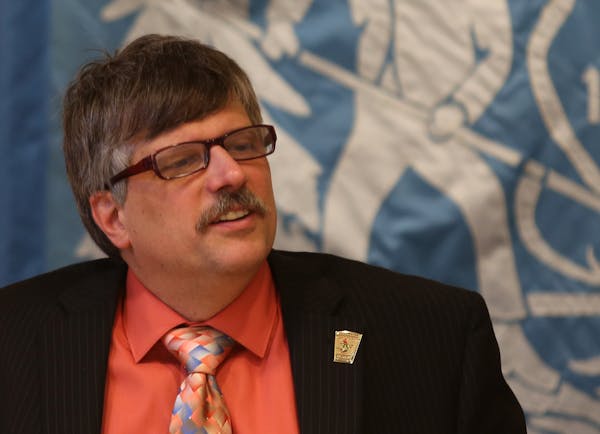Before sentencing former Stillwater Mayor Ken Harycki Wednesday for defrauding the federal government of millions of dollars, U.S. District Judge Ann Montgomery said it was bizarre how he had became involved in the crime without apparently thinking it through.
Harycki, who owned a private accounting and payroll business, is a CPA and has a master's degree. And he never profited from his wrongdoing.
So Montgomery made a significant departure from sentencing guidelines and sent him to prison for one year and a day. Harycki also will have to pay more than $2.1 million in restitution to the government.
"I accept full responsibility for my crimes," he said. "I'm a better person than that."
The sentence came more than 2-1/2 years after Harycki pleaded guilty to tax fraud. His plea included a provision that he would give "substantial" assistance in the prosecution of co-conspirators Thurlee and Roylee Belfrey.
The twin brothers, indicted on charges of health care fraud and tax evasion, pleaded guilty on Sept. 14 just days before their trial was scheduled to begin. The judge had delayed Harycki's sentencing until the Belfrey case was resolved.
Harycki, 54, began doing accounting work for the Belfreys and their companies in 2007 and came under IRS investigation in October 2012, according to criminal charges filed against him.
Court documents said that he had prepared falsified tax forms on their behalf and created a shell company, MKH Holdings Inc., to hide money owed the government.
Harycki abruptly resigned as Stillwater's mayor in November 2014, citing personal problems. His crimes occurred during most of the nearly eight years he served as mayor, though the charges filed against him didn't relate to his elected position. He was first elected mayor in 2006.
Montgomery said the sentencing guideline for his crime ranged between 37 to 46 months. In arguing for the lowest possible sentence she could justify, Harycki's attorney Joe Friedberg told the judge he hoped the sentencing memo he sent her didn't appear too glib.
He said Harycki was "a good ship moving in harm's way." The longer his sentencing was delayed, the more he cooperated with the prosecution, said Friedberg.
"He was way up on the level of cooperation," he said.
After thoroughly reviewing his client's case, Friedberg said he couldn't understand how Harycki could commit the fraud when there was nothing in it for him. He thought maybe the Belfreys were blackmailing him, which wasn't the case.
"Ken kept putting his own money into the company in the hopes he could straighten things out," Friedberg told the judge. "He's the most trusting and naive person I've ever met."
But Harycki did make choices, and he started filing false payroll and tax forms immediately after starting in business with the Belfreys, said Assistant U.S. Attorney Robert Lewis.
"He did this until the Belfreys tapped him out of money," he said. "And he lost a lot of money."
Montgomery asked Lewis what kind of sentencing consideration she should give Harycki because of the long wait for sentencing. Lewis said Harycki did offer substantial assistance for the prosecution.
With his family behind him in the gallery, Harycki told Montgomery he had spent many sleepless nights contemplating his crime. Saying it wasn't an excuse, he talked about some serious illnesses affecting his family.
"I want to apologize to the U.S. government and to Stillwater, which didn't deserve the negative attention because of me," he said.
He went on to say how his family had had to endure insults and finger-pointing. Before the charges, he said, they lived a normal life: church, Scouts, youth sports.
"I hope some day my kids will be proud for standing up and taking responsibility," he said. "I'm ashamed and embarrassed for what I've done."
Montgomery said Harycki had made a terrible mistake, but "made much better decisions more recently." She cited his exemplary public service and said she would have given him a longer sentence had the sentencing hearing been held several years ago.
Right before Harycki entered the courtroom, an unnamed woman who said she was a victim of his crimes confronted him. Family members and security guards quickly stepped in.
After the hearing, Friedberg said that Harycki had received a good and fair sentence.
"He kept throwing good money after bad money," he said. "Naiveté and intelligence don't go hand in hand."
david.chanen@startribune.com • 612-673-4465
kevin.giles@startribune.com • 651-925-5037

Minneapolis reaches $150k settlement with eyewitness of George Floyd's murder

Israel-Hamas war creates 'really fraught times' at Minn. colleges

Rare and fatal brain disease in two deer hunters heightens concerns about CWD

